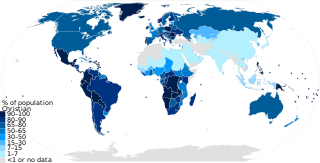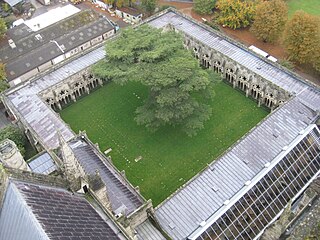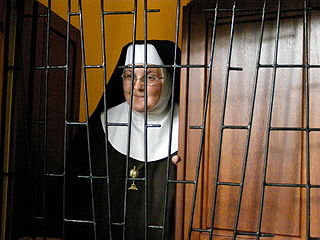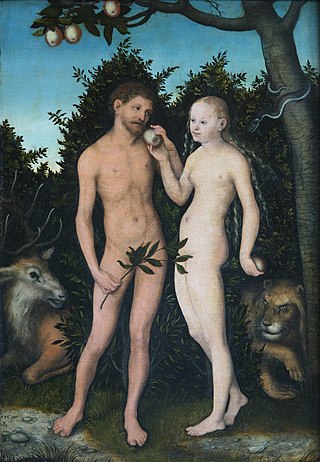Apostate capiendo (Latin for "taking an apostate") [1] was an old English writ against an individual. It prescribed the arrest of a person, who having entered and professed some religious order (such as a monk), broke from his cloister, contrary to the rules of his order. [2] [3]

An abbey is a type of monastery used by members of a religious order under the governance of an abbot or abbess. Abbeys provide a complex of buildings and land for religious activities, work, and housing of Christian monks and nuns.
Canon law is a set of ordinances and regulations made by ecclesiastical authority for the government of a Christian organization or church and its members. It is the internal ecclesiastical law, or operational policy, governing the Catholic Church, the Eastern Orthodox and Oriental Orthodox churches, and the individual national churches within the Anglican Communion. The way that such church law is legislated, interpreted and at times adjudicated varies widely among these four bodies of churches. In all three traditions, a canon was originally a rule adopted by a church council; these canons formed the foundation of canon law.

Christendom historically refers to the Christian states, Christian empires, Christian-majority countries and the countries in which Christianity dominates, prevails, or that it is culturally or historically intertwined with.
Apostasy is the formal disaffiliation from, abandonment of, or renunciation of a religion by a person. It can also be defined within the broader context of embracing an opinion that is contrary to one's previous religious beliefs. One who undertakes apostasy is known as an apostate. Undertaking apostasy is called apostatizing. The term apostasy is used by sociologists to mean the renunciation and criticism of, or opposition to, a person's former religion, in a technical sense, with no pejorative connotation.

Worcester Cathedral is an Anglican cathedral in Worcester, in Worcestershire, England, situated on a bank overlooking the River Severn. It is the seat of the Bishop of Worcester. Its official name is the Cathedral Church of Christ and the Blessed Mary the Virgin, of Worcester. The present cathedral church was built between 1084 and 1504, and represents every style of English architecture from Norman to Perpendicular Gothic. It is famous for its Norman crypt and unique chapter house, its unusual Transitional Gothic bays, its fine woodwork, and its "exquisite" central tower, which is of particularly fine proportions. The cathedral contains the tombs of King John and Prince Arthur.

In Christianity, an anchorite or anchoret is someone who, for religious reasons, withdraws from secular society so as to be able to lead an intensely prayer-oriented, ascetic, or Eucharist-focused life. While anchorites are frequently considered to be a type of hermit, unlike hermits they were required to take a vow of stability of place, opting for permanent enclosure in cells often attached to churches. Also unlike hermits, anchorites were subject to a religious rite of consecration that closely resembled the funeral rite, following which they would be considered dead to the world, a type of living saint. Anchorites had a certain autonomy, as they did not answer to any ecclesiastical authority other than the bishop.

A cloister is a covered walk, open gallery, or open arcade running along the walls of buildings and forming a quadrangle or garth. The attachment of a cloister to a cathedral or church, commonly against a warm southern flank, usually indicates that it is part of a monastic foundation, "forming a continuous and solid architectural barrier... that effectively separates the world of the monks from that of the serfs and workmen, whose lives and works went forward outside and around the cloister."
Apostasy in Islam is commonly defined as the abandonment of Islam by a Muslim, in thought, word, or through deed. An apostate from Islam is referred to by using the Arabic and Islamic term murtād (مرتدّ). It includes not only explicit renunciations of the Islamic faith by converting to another religion or abandoning religion altogether, but also blasphemy or heresy, through any action or utterance which implies unbelief, including those who deny a "fundamental tenet or creed" of Islam.
Istihlal is a term used in Islamic jurisprudence, or fiqh, to refer to the act of regarding some action as permissible, or halaal, although it is haraam; the implication is that such a regard is an erroneous and improper distortion of Islamic law. The word "istihlal" is derived as Stem X of the Arabic consonantal root ح-ل-ل meaning "to untie", "to solve", "to dissolve", "to open", "to release", etc.
A religious is, in the terminology of many Western Christian denominations, such as the Catholic Church, Lutheran Churches, and Anglican Communion, what in common language one would call a "monk" or "nun". A religious may also be a priest if he has undergone ordination, but in general he is not.
The canon law of the Catholic Church is "how the Church organizes and governs herself". It is the system of laws and ecclesiastical legal principles made and enforced by the hierarchical authorities of the Catholic Church to regulate its external organization and government and to order and direct the activities of Catholics toward the mission of the Church. It was the first modern Western legal system and is the oldest continuously functioning legal system in the West, while the unique traditions of Eastern Catholic canon law govern the 23 Eastern Catholic particular churches sui iuris.

Enclosed religious orders or cloistered clergy are religious orders whose members strictly separate themselves from the affairs of the external world. In the Catholic Church, enclosure is regulated by the code of canon law, either the Latin code or the Oriental code, and also by the constitutions of the specific order. It is practised with a variety of customs according to the nature and charism of the community in question. This separation may involve physical barriers such as walls and grilles, with entry restricted for other people and certain areas exclusively permitted to the members of the convent. Outsiders may only temporarily enter this area under certain conditions. The intended purpose for such enclosure is to prevent distraction from prayer and the religious life and to keep an atmosphere of silence.

Hilary was a medieval bishop of Chichester in England. English by birth, he studied canon law and worked in Rome as a papal clerk. During his time there, he became acquainted with a number of ecclesiastics, including the future Pope Adrian IV, and the writer John of Salisbury. In England, he served as a clerk for Henry of Blois, who was the bishop of Winchester and brother of King Stephen of England. After Hilary's unsuccessful nomination to become Archbishop of York, Pope Eugene III compensated him by promoting him to the bishopric of Chichester in 1147.
Walter de Coventre was a 14th-century Scottish ecclesiastic. There is no direct evidence of his birthdate, his family, or his family's origin, although he may have come from the region around Abernethy, where a family with the name de Coventre is known to have lived. Walter appeared in the records for the first time in the 1330s, as a student at the University of Paris. From there he went on to the University of Orléans, initially as a student before becoming a lecturer there. He studied the arts, civil law and canon law, and was awarded many university degrees, including two doctorates. His studies were paid for, at least partially, by his benefices in Scotland. Despite holding perhaps more than five benefices at one stage, he did not return to Scotland until the late 1350s.
Richard de Morins, also known as Richard of Mores, Richard de Mores, Ricardus de Mores, and Ricardus Anglicus was an English Augustinian canon of Merton Priory, before becoming prior at Dunstable Priory in 1202.

Women play significant roles in the life of the Catholic Church, although excluded from the Catholic hierarchy of bishops, priests, and deacons. In the history of the Catholic Church, the church often influenced social attitudes toward women. Influential Catholic women have included theologians, abbesses, monarchs, missionaries, mystics, martyrs, scientists, nurses, hospital administrators, educationalists, religious sisters, Doctors of the Church, and canonised saints. Women constitute the majority of members of consecrated life in the Catholic Church: in 2010, there were around 721,935 professed women religious. Motherhood and family are given an exalted status in Catholicism, with The Blessed Virgin Mary holding a special place of veneration.

The Writ De Excommunicato Capiendo Act 1562 was an Act of the Parliament of England.
A rector is, in an ecclesiastical sense, a cleric who functions as an administrative leader in some Christian denominations. In contrast, a vicar is also a cleric but functions as an assistant and representative of an administrative leader.
Giuliano l'Apostata is a 1919 Italian historical drama film directed by Ugo Falena, starring Guido Graziosi and Ileana Leonidoff. Set in the 4th century, it is a biographical film about the Roman Emperor Julian, known as Julian the Apostate for his rejection of Christianity.